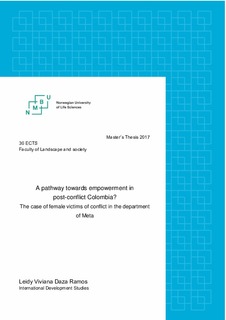| dc.description.abstract | In this thesis I seek to examine the perceptions that female victims of violence in Meta, Colombia hold regarding empowerment, as they understand it from their life experiences before and after being victimized. I also aim to explain the life strategies that these women implemented in order to overcome challenging situations. In doing this, I explore the links that exist between such strategies and post-conflict reconstruction in the struggle to achieve sustainable and durable peace in the country. In the first section of the thesis I examine how the term empowerment has permeated the academic literature through a historical retrospective of its use from the early 70s by women’s grassroots organizations. In addition, I explore the evolution of the term and its inclusion in the development agenda jargon, which has served as a bastion to advocate for the rights of the disenfranchised and most vulnerable ones. Secondly, I delve into the literature regarding women’s role in post-conflict reconstruction of conflict afflicted countries around the world.
I argue that although much attention is paid to the displacement phenomena in Colombia with development programs and public policies that aim to promote empowerment amongst female victims, their own voices remain unheard. The ways in which conflict victims experience and cope with adversity vary from person to person. This suggests that the pathways to empowerment are essentially personal endeavors that derive from people’s own perceptions and from their relations with others in the community. In the second section of this thesis I analyze the findings in light of the theoretical framework previously provided. With this, I address the significance of female victims’ perceptions regarding empowerment focusing on narratives about their lives before and after being victimized. In exploring the mechanisms that the female victims implemented, I shed light on the factors that may have contributed, or not, to their empowerment process and to the reconstruction of their communities.
From my findings, I argue that female victims perceive themselves as empowered women who are able to overcome obstacles and strength their livelihoods. Participants do not longer feel victims of the conflict; instead, they feel they are agents of change. In particular, findings suggest that the life strategies participants implemented have positively influenced their perceptions about self-reliance and self-worth. In addition, these life strategies have fostered participants’ social and political participation in their communities. | nb_NO |

